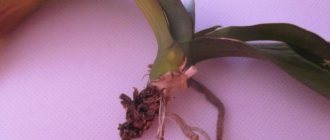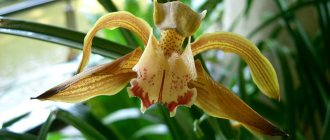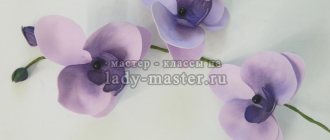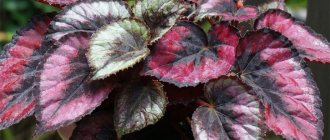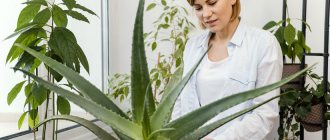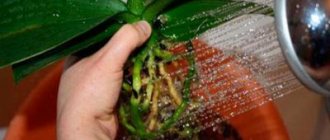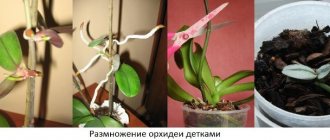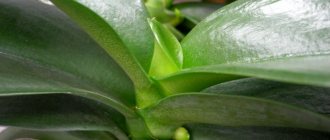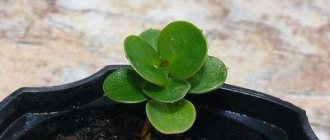Indoor orchid
- a special ornamental plant, capricious and demanding of care.
Yes, it attracts attention with its original exotic flowers, but in order for your “overseas” guest to delight you with health and abundant flowering for a long time, you need to know how to choose a young orchid when buying in a store
.
And remember, phalaenopsis
is not a variety of
orchid
, it is
a species
, a family.
Features of caring for plants intended for sale
Often the flower is not maintained properly at the point of sale. The interior flora of the store may contain fungi and pests, and if the orchid has been in such a room for several days, it is no longer healthy.
First of all, when purchasing, find out how long ago the flower was imported, and also look at the conditions in which the plant is kept.
Plant conditions:
The shelf on which the flower pots are located in the store must be dry and clean.
In addition, there should be no water in the tray where the orchid pots are installed. Containers with plants must be transparent and have numerous holes for ventilation of the roots. Pay attention to the moisture content of the substrate, as the plant will better tolerate relocation and adaptation if it is not watered.- Another nuance is the presence of a special tag, which will indicate under what conditions the species should be kept and its name.
- Along with the flower, you should buy a mixture for replanting. It is worth understanding that materials that retain moisture, such as moss, are often placed in pots for transportation. And if it is not removed in time, the roots may soon rot.
When buying flowers in a large supermarket, you should be very careful, since it is in these places that the plants practically do not receive proper care - there are often no qualified florists there.
Read more about how to properly care for an orchid in a separate article.
Additional Information
Even if all external indicators of the plant’s health are in order, experienced gardeners check the top layer of soil, where some types of pests may be hiding. The leaves are felt on both sides, because the scale insects can survive unfavorable conditions on them.
Many people have a question, how much does an orchid cost? The pricing policy is based on the uniqueness of the hybrids, their popularity and the costs of the breeding company. Typically the indicators are as follows:
- The average price for Phalaenopsis is 1000 rubles. The maximum cost for expensive hybrids is more than 2000 rubles.
- The average cost of Cymbidium is 3000 rubles. As for the maximum costs for rare varieties, they can be about 5,000 rubles.
- Dendrobium costs about 800 rubles. And its rare species cost around 1000 rubles.
- The cost of Paphiopedilum (Venus's slipper) costs around 1000 rubles. For more expensive hybrids you can pay more than 2000 rubles.
- How much a particular orchid costs in a flower shop may also depend on its age and duration of flowering.
Conclusion
Choosing a flower that will decorate offices and greenhouses, delight with flowering and pacify with a period of rest is a responsible and important process. Knowing simple rules, you can buy a beautiful and strong plant.
What to look for when making a decision?
To purchase a healthy flower, you need to pay attention to the following nuances of choice::
- We carefully examine the orchid - the foliage should be healthy, without spots, damage or wilting.
- We inspect the peduncle - it is better to buy plants that will have not only blossoming flowers, but also buds. It is this fact that will allow you to admire the flowering for another month and a half after purchasing the orchid.
- We inspect the roots - if they are brown, it is better not to buy the plant.
Plant age
Abundantly blooming orchids make it tempting to buy them. Of course, they are very cute and the decision to buy them seems quite logical. After all, it immediately becomes clear what size and color her flowers are, and whether they satisfy the buyer’s requirements. Another reason for buying a flowering orchid may be the buyer’s lack of patience; he immediately wants to have a flowering plant.
However, you need to buy blooming orchids with great caution, and maybe it’s even better to refuse it altogether. It is important to understand here that the flowering process requires a lot of strength and nutrition, and it can continue for a long time. Therefore, there is a high probability of buying an old, very weakened plant that has been on the store shelf for a long time.
Advice! It is better to buy a blooming orchid when the bulk of the buds on it are in an unopened state, which indicates the beginning of flowering. Before doing this, carefully check the peduncle for pests.
Young orchids, as a rule, have a lower price than older plants that are endowed with the ability to bloom. Young flowers differ from adults in having fewer leaves and the absence of a peduncle. Adult plants are able to bloom 2-4 times a year, and seedlings will begin to form flowers after 2-3 years. Taking this into account, it is better to purchase an orchid that is sufficiently mature.
Step-by-step instruction
Which flower lover doesn’t want to know how to choose the right orchid, and it doesn’t really matter whether the flower is bought as a gift or to take home. Let's take a closer look at what you should pay special attention to when purchasing.
Inspection of roots
The most important part of an orchid is the roots , since in addition to feeding the plant and moisturizing the leaves, they are involved in photosynthesis.
Healthy roots are light green if the substrate is dry, and dark green if the flower is watered.
When examining the plant, gently pull the rosette ; if the roots are healthy, you will feel resistance, in which case you can choose this specimen.
Appearance of leaves
When examining the foliage, it is sometimes difficult to determine the health of any type of orchid, since the color of the upper part can vary greatly among different varieties. In this case, it is worth paying attention to the color saturation - the leaves are thick, fleshy, glossy with a bright color - the plant is overfed with fertilizers and it will not bloom.
Inspect the growing point; there should be no damage on it . Also, there should be no wet spots or lesions on the foliage.
Peduncle condition
Often the choice falls on a beautifully flowering plant. Therefore, carefully examine the peduncle. It is better to buy a crop that, in addition to flowers, also has unopened buds.
Flowers should not only be bright, but their foliage should also be resilient. It is better not to buy an orchid with wilted flowers.
Signs of disease or pests
Signs that may indicate orchid diseases:
- coating on leaves in the form of fluff;
- spots on leaves of different sizes are brown or black;
- wet ulcers;
- brown roots;
- rotten growing point.
Insects may appear on the flower; signs of damage are as follows::
- growths and tubercles on the inside of the leaf are infestation with scale insects;
- cobwebs on the leaves - spider mites;
- a silvery film coating on the inside of the leaf is thrips;
- the roots are damaged - they were eaten by polygons;
- holes in the leaves are midges.
Orchid colors
The color scheme of the orchid delights with its diversity. The meaning of the plant depends on the color of its inflorescences:
- It is appropriate to give a pink orchid to a young girl. This color symbolizes love, lightness, joy. It is believed that it relieves adversity and troubles, protects against problematic situations and helps to cope with difficulties on the path of life. Shades of pink may vary. They range from soft powdery to vibrant fuchsia tones;
- white is a symbol of purity, elegance and tenderness. It is better to give a white orchid to newlyweds for a wedding. It also characterizes the beginning of life, purity, lightness, so a white orchid flower can be presented in honor of the birth of a baby;
- yellow - favors creative endeavors. This is a good gift for a friend with wishes of cheerfulness and a positive attitude. Also, a lemon-colored flower is suitable as a gift for a colleague. Yellow is the color of the sun, self-confidence, determination in business and determination;
- A purple orchid will be an excellent gift for an older woman. With its mysterious lilac hue, it carries admiration, respect, and veneration. Purple color is considered mystical among the entire color palette; it develops intuition, creativity and intellectual abilities of a person;
- It is better to choose variegated colors of orchids for your beloved. It can be a yellow-red flower or a white peduncle with purple splashes - there are a great many combinations. They say that such shades are attractive, attract the attention of your significant other, and excite new emotions. Inflorescences of variegated tones are subconsciously perceived by a person as a promise to a serious relationship, and without words it will become clear that you chose this shade not by chance, and approached the issue thoughtfully.
Flowering period
It’s hard to pass by a blooming orchid; you immediately want to buy it and take this splendor home. The advantage of such a purchase is the fact that you can immediately see what color the buds will be. But it is worth knowing about some of the risks that may lie in wait when purchasing a flowering plant.
During flowering, an orchid gives a lot of strength and energy to its inflorescences . For example, Phalaenopsis can bloom for several years in a row and then die. So it turns out that if a plant went on sale blooming and stood there for a long time without going into dormancy mode, then it may die after purchase (learn about how to care for an orchid after it blooms and what to do to make it bloom again , available here).
What type of orchid to choose
When choosing such an exotic plant as an orchid, you also need to have an idea of how it will relate to the interior of your room and whether it will complement it harmoniously. Flower shops in most cases offer the following types of orchids:
- Phalaenopsis;
- Dendrobium;
- Shoes;
- Phalaenopsis hybrid;
- Cymbidium.
Phalaenopsis
This is perhaps the most common type of orchid. Many people call this species the butterfly orchid for its visual similarity to this insect. A unique feature of Phalaenopsis is the ability to form 2 peduncles, abundantly strewn with large flowers. The variety of color shades of the Phalaenopsis orchid is amazing: flowers range from black to snow-white.
Flower growers note the convenience of growing this type of orchid at home. Limitations may include direct sunlight and the required temperature conditions. Phalaenopsis blooms 2 times a year for several months.
Dendrobium
The most widespread hybrid form of this type of orchid. The flowering period is accompanied by the appearance of large flowers of red, yellow or white colors. Dendrobium prefers cool conditions. It is usually placed on warm balconies or loggias. Increased air temperature prevents flowering and promotes the appearance of children, which, upon reaching a certain maturity, are transplanted into a separate pot.
Shoes
Among domestic orchids, Paphiopedilum or, as it is more often called, Shoes, is widespread. This type of orchid earned its name because of the unusual shape of the flower, reminiscent of a shoe, slippers or slipper. Flower stalks in plants of this species appear up to several times a year and bloom for several months. It turns out that the orchid blooms almost all year round.
Another distinctive feature of the Shoe orchid is the shape of the leaves with patterns applied to them with a bizarre alternation of stripes and spots.
Experts have bred many hybrids of this type of orchid, which have proven themselves when grown at home.
Cymbidium
The hybrid form of this type of orchid is often found on the shelves of flower shops. The flowers of this plant have a wide range of colors. The leaves are usually oblong and narrow. You can recognize the plant by its so-called pseudobulbs - thickenings that resemble an onion.
The Cymbidium orchid is capable of forming several peduncles, but for this you need to provide the plant with proper care, which includes good lighting and a difference in day and night temperatures. At elevated indoor temperatures, an orchid may lose all its blooming flowers.
It is better to place Cymbidium on a warm glazed balcony or in a winter garden. In city apartments, experienced gardeners grow only hybrid forms.
Phalaenopsis hybrid
This type of orchid is the closest relative of Dendrobium. But its flowers resemble Phalaenopsis vulgaris in appearance and are purple or crimson in color. The plant is distinguished by its unpretentiousness to temperature conditions, so it can be successfully grown in a city apartment.
Choosing an orchid for home growing is a responsible process, because not only the success of the growing process itself, but also the appearance of your room depends on how healthy the plant is and is capable of producing a large number of colorful flowers.
Well, who doesn’t want to make their home more beautiful every day? In order to decorate it, you don’t have to make repairs every year and update the decor with every new fashion trend; sometimes it’s enough just to buy a lovely plant. A wonderful exotic orchid will help to decorate any room and create a cozy atmosphere in it. Over the past few years, it has enjoyed enormous popularity even in our temperate latitudes.
But how to choose the right orchid for your home? What should you pay attention to when buying in a store or market? Now we will look into this.
For beginner gardeners, I’ll say right away that out of all the abundance of varieties and types of orchids, prefer a hybrid plant (it is best to choose Phalaenopsis hybrids). This flower does not require special care skills, is relatively unpretentious to environmental conditions and is quite hardy. The risk that the flower will wither, pests will appear, or diseases will appear that you cannot control is quite small. At the same time, hybrid orchids are in no way inferior in beauty to pure varietal ones.
Substrate and pot: what should they be?
You came to the store to buy an orchid, what should your eyes first fall on:
- If the roots of the plant are in moss, then it should be fluffy, not crushed and preferably dry.
- If there is a soil mixture in the pot, then you should pay attention not only to the composition of the substrate, but also to its moisture content - the plant should not be over-moistened.
- The pot should be transparent, since thanks to the roots involved in photosynthesis, the plant develops and blooms better.
In addition, you can calmly inspect the plant and assess the condition of the roots .
Condition of leaves, peduncle, roots
In order not to be upset after buying an orchid, but to enjoy the beauty of exquisite tropical inflorescences, you need to know for sure how to choose a healthy plant.
The inspection should begin with the root system. Through the transparent walls of the pot it is easy to see the true state of the roots. In healthy plants, the root tips are bright green.
Aerial roots must be probed. In a normally developed flower, they will be hard and elastic, and not hollow and soft. Pick up the pot and shake it a little. If there are healthy roots, the plant in the pot will not sway from side to side.
Next we move on to examining the leaf apparatus of the plant. A normal, viable orchid will have dense and elastic leaves with an intense green color. Slight shades of color are allowed. Avoid flowers with cracked, wrinkled or limp leaves. The presence of plaque or sticky layers, spots or stripes on the leaf plate is unacceptable, indicating damage to the plant by pests and diseases.
Orchids are valued for their unusually beautiful flower stalks, so you need to pay enough attention to them. You should purchase plants that have not only blooming fragrant flowers on the peduncle, but also buds about to bloom. During transportation of a pot with a plant, the orchid experiences a lot of stress and can drop its blossoming flowers, and the buds after stress will turn into beautiful flowers. The elasticity and density of the flower also indicate proper quality of care.
Where can I buy a healthy plant and how much will it cost?
Nowadays you can buy an orchid at any retail outlet that sells flowers, but if we talk about a healthy plant, it is better to go to a special greenhouse. This is where specialists who know their business work.
Professional sellers will not only give advice on the plant’s agricultural technology, but will also select an orchid variety that will feel great in a single apartment.
Flowers grown in specialized greenhouses are much more resistant to diseases and viruses and resist pest attacks well.
It is in this place that proper care is organized for them, and the habitat is as close to natural as possible (we talked in detail about where orchids grow in nature and how they are classified in this article).
Another reason to go shopping in a greenhouse is the huge selection of varieties and species of this exotic plant (you can learn more about rare and unusual varieties of orchids here).
No flower shop can offer you such a wide variety of flowers. The cost of orchids in a greenhouse will be 890-4,000 rubles, depending on the variety, type, and delivery method.
How to care for an orchid at home
Depending on what time of year you purchased the flower, the first care
.
Watering
If the plant was purchased during a cold period, you need to wait until the orchid
warms up, and then inspect the condition of the substrate in the pot. If the soil is moist enough, delay watering for 3-5 days. Excessive moisture will only harm this flower.
If the plant was bought and transported in hot weather, after delivery “to your home” you need to immediately moisten the roots and stem. It is best to use a special flower sprayer for this.
Top dressing
In specialized stores
They monitor the condition of flowers very carefully, especially such exotic ones as orchids. Most likely, at the time of purchase, the plant receives enough nutrition from the fertilizer in the pot. It is better to carry out the first feeding at least 30 days after purchasing the flower.
Transfer
You should not replant the plant immediately after purchase. This will only increase the stress of the move and can lead to the death of the orchid or the dropping of flowers. If replanting cannot be avoided, wait until the flowering period ends.
Consequences of a bad choice
Often newcomers to floriculture say that as soon as a beautifully flowering orchid entered an apartment, it dropped its flowers and died over time, while proper care was provided for it.
This may be the consequences of choosing the wrong plant in the store. From there you brought a plant that was sick or infected with parasites. As a result of stress, the plant's weakened immunity cannot withstand it and the plant dies .
Love of convenience is the key to no problems with orchids
Orchids often appear in the home as a gift, a pleasant surprise from loved ones, or as a result of spontaneous purchases made under the spell of their beauty or percentage discounts. But if you buy orchids consciously, you should choose them not only according to the dictates of your heart and taste. Rather, on the contrary: you should not succumb to the charm of these special plants and evaluate their decorative qualities until all practical aspects have been studied (conditions, care, stages of development) and the chances of success have been soberly assessed.
First of all, it is worth analyzing and objectively assessing the conditions in the house and potential places where you can place the orchid. It is worth looking for “a place for a plant”, and not vice versa, only in the case of a gift. Available conditions, especially the ability to provide cool conditions and control air humidity, will already limit your choice to just a few types.
If you want a reliable option without the hassle, it is better to avoid buying a “complicated” species in favor of a plant that will look good in any living room.
The unspoken rule according to which any orchid on “mass sale” can be perceived as quite suitable for home culture is not far from the truth. If you are not an experienced collector, it is better to take a closer look at the assortment and aesthetics of orchids in supermarkets, hypermarkets and specialized flower shops. The species that can be found on the shelves are those very unpretentious plants. It is not necessary to buy an orchid there, because you can then search for varieties and colors to suit your taste in other places.
Phalaenopsis
Where to buy orchids for your home?
Delivery from large flower and garden centers, popular websites, local flower shops, greenhouses, collectors and professional clubs - there are many options. It is always safer to choose a plant in person than from a photo and description. But in any case, you can buy a healthy orchid if you are careful.
In addition to assessing the condition of the orchid, special attention should be paid to the quality of delivery and packaging, the reputation of the seller and guarantees. And the “freshness” of the plants, the length of stay in the sales area (ideally no more than 2-3 weeks after delivery).
Category: “Question – answer”
Question No. 1. I was given two phalaenopsis for my birthday. One bloomed for almost two months, and the other for only two weeks. Why is that?
Answer.
Most likely, the specimen that bloomed longer had more unopened buds. Therefore, the flowers opened in a new place. Another phalaenopsis, whose flowers withered earlier, spent most of its flowering time in the store. You got its final stage. Next time, when purchasing an orchid, buy a plant with buds, then it will bloom longer at your place, and not at the time of sale.
Additionally, the duration of flowering depends on the variety or hybrid of Phalaenopsis, some bloom for about three months and others for much less.
